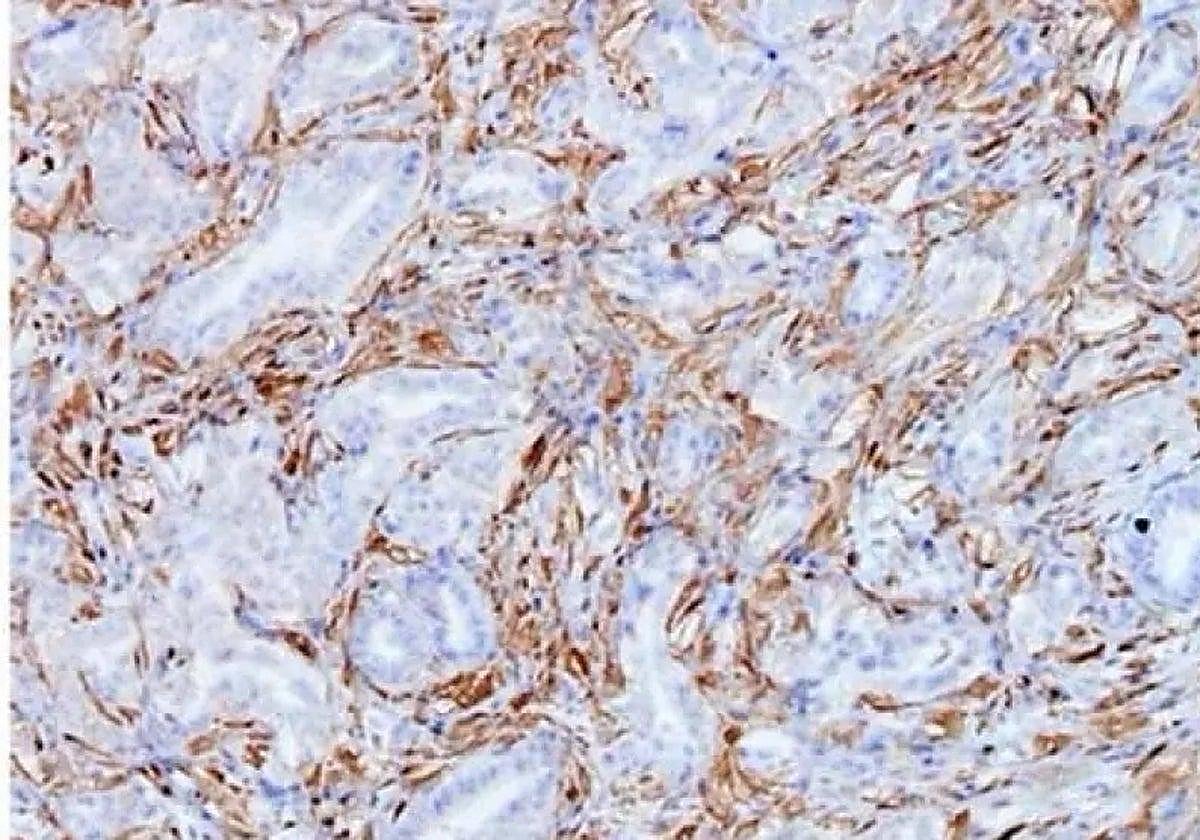

Sections
Highlight

A. P.
Madrid
Thursday, 17 April 2025, 15:15
A study led by the Hospital del Mar research institute in Barcelona has identified one of the keys to the high aggressiveness of pancreatic cancer. The research, published in the peer-reviewed journal of the National Academy of Sciences (PNAS) in the United States, reveals the role of the protein Galectin-1 in the nucleus of the cells that surround the tumour in pancreatic cancer, the fibroblasts (the key components of the tumour microenvironment known as TME), which contribute to the activation of that particular cancer. According to La Caixa foundation, everything responds to the stroma, the set of cells that are essential for the tumour to grow and expand.
"This stroma is considered a key element in the aggressive biology of pancreatic cancer as it interacts with tumour cells, protects them and prevents the action of drugs," says Pilar Navarro, coordinator of the research group focusing on new molecular targets in cancer within Hospital del Mar's research institute and in collaboration with two major, international, biomedical research institutes in Spain: the IIBB-CSIC and IDIBAPS. In her opinion, stromal cells, particularly fibroblasts, "produce substances that favour the tumour and facilitate growth and spread."
Until now fibroblasts were known to secrete Galectin-1, a protein with pro-tumoural properties. This study shows that the molecule "is also found inside fibroblasts - in the nucleus - where it plays a key role in controlling gene expression [the process by which the information encoded in a gene is turned into a function]."
The researchers have seen how Galectin-1 displays the ability to regulate gene expression in these cells at a very specific level, "without modifying the DNA sequence, through epigenetic control." According to Navarro, one of the genes on which it acts is KRAS, which plays a fundamental role in pancreatic tumours. Not surprisingly, this gene is also found in the tumour cells of 90% of patients with this cancer, but in this case it is mutated.
The experts involved in the study had already identified the prominent role of Galectin-1 in pancreatic cancer in previous studies, but the new functions now discovered "open the door to designing new strategies to attack this type of tumour".
The researchers worked with samples from pancreatic cancer patients and carried out in vitro experiments with human fibroblast cell lines, where they investigated the effects of inhibiting both the protein and the KRAS gene. Judith Vinaixa, one of the researchers at Hospital del Mar and lead author of this paper, highlights the relevance of these results: "We have proven the importance of the role of Galectin-1 in the cell nucleus of fibroblasts where it regulates the expression of multiple, important genes for the cell."
CaixaResearch Institute expert and member of the Ibyme-Conicet biomedical research institute in Argentina, Gabriel Rabinovich, explains that the next steps in this research will be to explore drug therapy combinations to inhibit Galectin-1 on both fronts: extracellular and intracellular.
Publicidad
Publicidad
Publicidad
Publicidad
Esta funcionalidad es exclusiva para registrados.
Reporta un error en esta noticia

Debido a un error no hemos podido dar de alta tu suscripción.
Por favor, ponte en contacto con Atención al Cliente.

¡Bienvenido a SURINENGLISH!

Tu suscripción con Google se ha realizado correctamente, pero ya tenías otra suscripción activa en SURINENGLISH.
Déjanos tus datos y nos pondremos en contacto contigo para analizar tu caso

¡Tu suscripción con Google se ha realizado correctamente!
La compra se ha asociado al siguiente email
Comentar es una ventaja exclusiva para registrados
¿Ya eres registrado?
Inicia sesiónNecesitas ser suscriptor para poder votar.